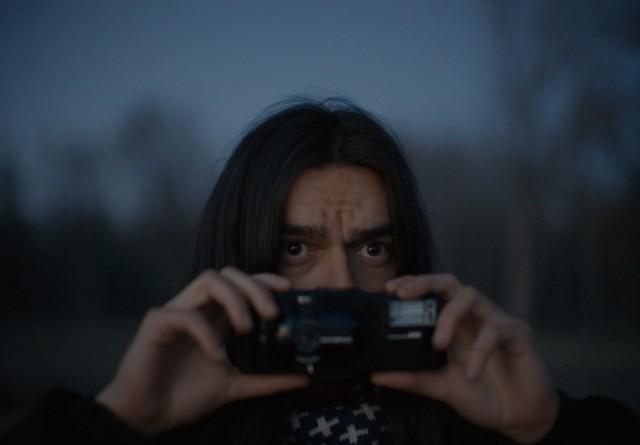To protect his father’s spirit on its journey to the afterlife, a young Ojibwe photographer must tend a sacred fire for four consecutive days and nights. Grief comes in many forms, and with Four Nights and a Fire, writer/director Alex Nystrom offers a poignant exploration of loss through a poetic, lyrical lens, while honoring the rituals of his Native community.
“I made Four Nights and a Fire to honor my late father”, Nystrom shared with us, discussing the origins of the project. He waited several years to pen the film, allowing him to have a greater understanding of his own journey through grief and explore its nuances in the screenplay. He also cites a desire to “connect deeper with my Native identity and Ojibwe culture”, as a key motivator behind the project. Explaining that developing this film was a way “to help me decolonize my worldview on grief and processing loss and honor that too”. While Four Nights and a Fire explores common themes, they are rarely portrayed from this perspective, which allows the film to offer a different depiction of such a universal topic.
“The first iteration of this film started as a poem”
In its exploration of grief, the narrative of Four Nights and a Fire introduces a spiritual layer, granting the film two points of view: the son’s and the father’s. Both are coming to terms with loss, and Nystrom cleverly weaves one into the other, enhancing the emotional depth of the film. The son’s perspective is dictated by this mission he chooses to honor, and how dedicated he is – his stubbornness also being a symptom of his grief process. Structurally, this gives the film clear stakes and an engaging pacing for the audience. In contrast, the father’s perspective has a quiet and calming peacefulness to it, which also helps to guide the audience to the acceptance stage of grief.
“The first iteration of this film started as a poem”, Nystrom confessed, and the poetic aspect of the story is still very much present in the final film. Far from being dialogue-heavy or plot-driven, the narrative instead creates a space to process the strong emotions it captures. The approach is very lyrical, and Mike Maliwanag’s (Dear Mama…) cinematography heavily contributes to building that atmosphere effectively. Reflecting both the Ojibwe culture of the protagonist and the fact that he is a photographer, the images are carefully composed, framing the surrounding nature as a character in its own right. With incredibly beautiful shots, the photography creates the perfect universe for the emotional journey we embark on.

Benny Wayne Sully stars as a son dedicated to keeping a sacred fire alive after the passing of his father
Ahead of its online debut, Four Nights and a Fire had a successful festival run with notable stops at the Palm Springs ShortFest, deadCenter and ImagineNATIVE. Nystrom is currently writing a feature film titled Spiral, which he describes as “a psychological horror that examines the fear of death and generational memory head-on”. He adds that the film will focus on “a grandson caring for his dementia-stricken grandmother who are both haunted by the spirit of the father”.

 Céline Roustan
Céline Roustan